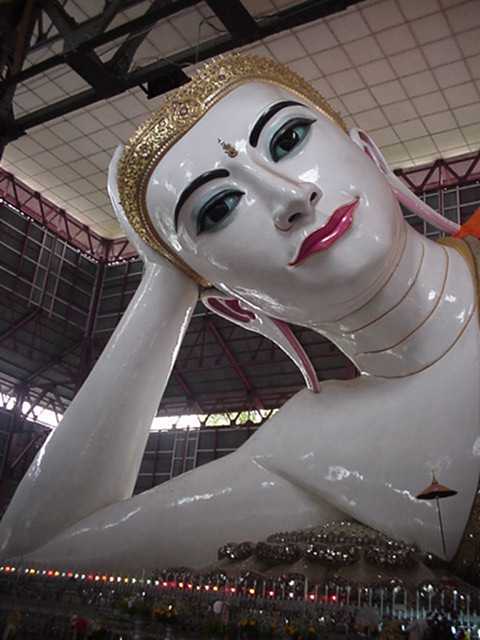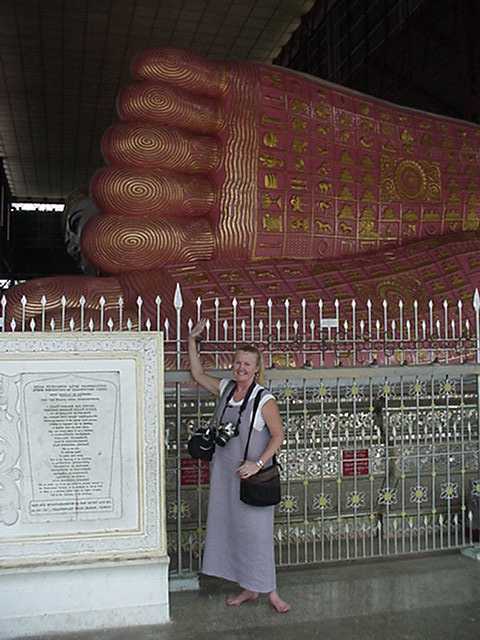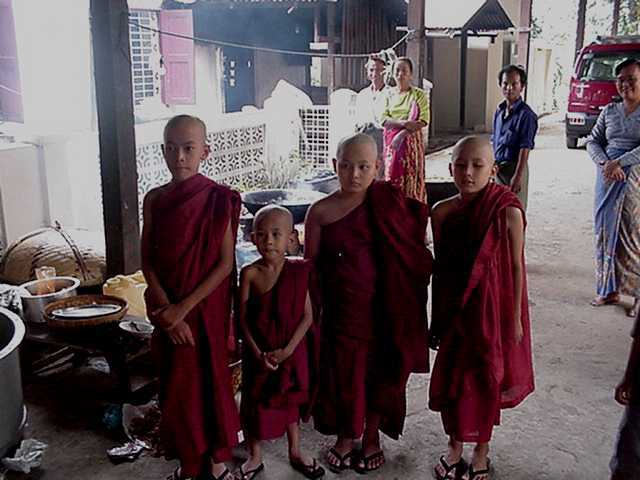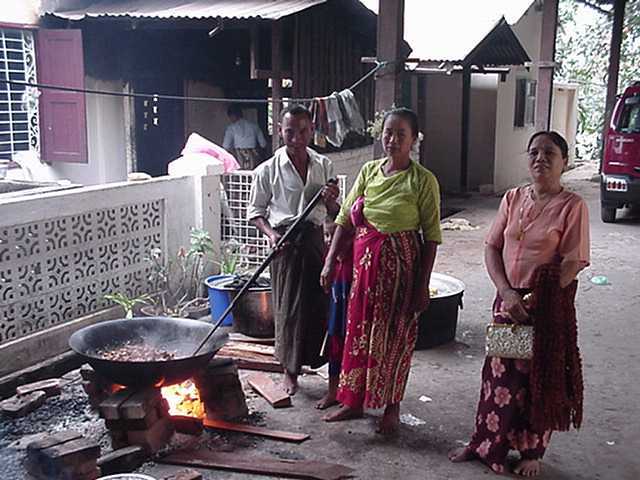Chaukhtatgyi
Paya
 The
Chaukhtatgyi Paya houses a huge reclining Buddha under a large sheet metal
roof, located near the Shwedagon Paya in Shwegondaing Lan. The photo to
the left captures the head of the reclining Buddha. To get
The
Chaukhtatgyi Paya houses a huge reclining Buddha under a large sheet metal
roof, located near the Shwedagon Paya in Shwegondaing Lan. The photo to
the left captures the head of the reclining Buddha. To get some sense of scale, click on the image to enlarge; the row of flickering
lights mark the top of a wrought iron gate that is waist high. The head
reaches a height of about 2 1/2 storeys. The Buddha is resting on his right
side, toes together, apparently in the classic parinibbana or dying position.
This is the position in which he attained enlightenment. However, much
like reclining Buddha at Shinbinthalyaung (in Bagan) he is facing the south,
indicating a resting position. The photo to the left shows the entirety
of the Buddha, a massive structure. Around the Buddha structure are a number
of fortune tellers offering palm reading and astrological predictions.
Like most Payas, this is a working shrine, filled with the faithful who
stop by to pray as a part of their daily goings-on.
some sense of scale, click on the image to enlarge; the row of flickering
lights mark the top of a wrought iron gate that is waist high. The head
reaches a height of about 2 1/2 storeys. The Buddha is resting on his right
side, toes together, apparently in the classic parinibbana or dying position.
This is the position in which he attained enlightenment. However, much
like reclining Buddha at Shinbinthalyaung (in Bagan) he is facing the south,
indicating a resting position. The photo to the left shows the entirety
of the Buddha, a massive structure. Around the Buddha structure are a number
of fortune tellers offering palm reading and astrological predictions.
Like most Payas, this is a working shrine, filled with the faithful who
stop by to pray as a part of their daily goings-on.
 In
the photo to the left, Tracy poses beside the foot of the Buddha, Not only
does this enhance the aesthetic quality of the photo, but it also provides
an additional sense of the scale of the statue. Notice the elaborate iconography
on the bottom of the Buddha's feet. Just as in the Sule Pagoda, the area
around the statue is divided into astrological signs. Near the feet is
the astrological sign for Wednesday, the tuskless elephant, which was the
birth sign of Siddhartha, born on a Wednesday. It is located in the northwest
corner of the Paya.
In
the photo to the left, Tracy poses beside the foot of the Buddha, Not only
does this enhance the aesthetic quality of the photo, but it also provides
an additional sense of the scale of the statue. Notice the elaborate iconography
on the bottom of the Buddha's feet. Just as in the Sule Pagoda, the area
around the statue is divided into astrological signs. Near the feet is
the astrological sign for Wednesday, the tuskless elephant, which was the
birth sign of Siddhartha, born on a Wednesday. It is located in the northwest
corner of the Paya.
 Outside
the walls of the Chauktatgyi Paya is a bustling market place, and the
Outside
the walls of the Chauktatgyi Paya is a bustling market place, and the  photo
to the right shows one of the many open-air kitchens that are sandwiched
between merchant's shops. The Paya is also very near the Ashay Tawya monastery,
and in the photo to the left, four young monks in training pose for a group
photo. This willingness to pose was typical throughout Myanmar, where the
people seemed eager to pose for our cameras.
photo
to the right shows one of the many open-air kitchens that are sandwiched
between merchant's shops. The Paya is also very near the Ashay Tawya monastery,
and in the photo to the left, four young monks in training pose for a group
photo. This willingness to pose was typical throughout Myanmar, where the
people seemed eager to pose for our cameras.

Return
to Yangon
Main
Page
 The
Chaukhtatgyi Paya houses a huge reclining Buddha under a large sheet metal
roof, located near the Shwedagon Paya in Shwegondaing Lan. The photo to
the left captures the head of the reclining Buddha. To get
The
Chaukhtatgyi Paya houses a huge reclining Buddha under a large sheet metal
roof, located near the Shwedagon Paya in Shwegondaing Lan. The photo to
the left captures the head of the reclining Buddha. To get some sense of scale, click on the image to enlarge; the row of flickering
lights mark the top of a wrought iron gate that is waist high. The head
reaches a height of about 2 1/2 storeys. The Buddha is resting on his right
side, toes together, apparently in the classic parinibbana or dying position.
This is the position in which he attained enlightenment. However, much
like reclining Buddha at Shinbinthalyaung (in Bagan) he is facing the south,
indicating a resting position. The photo to the left shows the entirety
of the Buddha, a massive structure. Around the Buddha structure are a number
of fortune tellers offering palm reading and astrological predictions.
Like most Payas, this is a working shrine, filled with the faithful who
stop by to pray as a part of their daily goings-on.
some sense of scale, click on the image to enlarge; the row of flickering
lights mark the top of a wrought iron gate that is waist high. The head
reaches a height of about 2 1/2 storeys. The Buddha is resting on his right
side, toes together, apparently in the classic parinibbana or dying position.
This is the position in which he attained enlightenment. However, much
like reclining Buddha at Shinbinthalyaung (in Bagan) he is facing the south,
indicating a resting position. The photo to the left shows the entirety
of the Buddha, a massive structure. Around the Buddha structure are a number
of fortune tellers offering palm reading and astrological predictions.
Like most Payas, this is a working shrine, filled with the faithful who
stop by to pray as a part of their daily goings-on.



